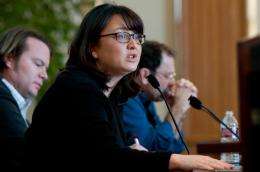'If Egyptians vote for candidates based on political issues, we might start to see a different landscape,' says political scientist Lisa Blaydes.
When millions of Egyptians took to the streets to demonstrate against the 30-year regime of Hosni Mubarak, they rocked the delicate political ecosystem of the Middle East. What should America do?
Ideally, nothing, said Joel Beinin, professor of Middle East history. "The best thing for the United States to do is absolutely nothing. Whoever the U.S. backs will be considered illegitimate.
Will America do nothing? "Absolutely not."
"The U.S. is a great power – uniquely, the sole superpower in the world. Great powers don't want change. They want stability."
Beinin spoke Monday at a noon discussion on the popular uprising in Egypt. He is an expert on the modern social history of Egypt and recent labor and protest movements there. His most recent book is The Struggle for Worker Rights in Egypt.
Democracy may remain elusive in the most populous country in Arab world. "It depends on what you think a democracy is," said Beinin. "Is democracy a set of procedural rules" that includes "an election that is more or less free" and "some chance of rotation of power?"
"That's a minimal definition that's utterly inadequate," he said.
"This is a word that doesn't have a clear content and can't be thrown around like the choice is democracy or dictator, democracy or political Islam."
Beinin noted that Egypt had a constitutional monarchy from 1922 until the Free Officers coup of 1952. Elections were mostly fraudulent, and the king had the right to dissolve parliament and appoint the prime minister.
"It's something that looked like democracy," Beinin said, however, "power was concentrated in 2,000 landowners" who were disproportionately represented in the government.
Beinin was joined by Lisa Blaydes, an assistant professor of political science and author of Elections and Distributive Politics in Mubarak's Egypt. The Freeman Spogli Institute for International Studies sponsored the event.
"I don't think there are any guarantees about what is going to happen moving forward," said Blaydes.
"It gets down to a fundamental problem in America: what it sees as its national interest and what its core values are as a democracy. How that is going to play out is not known. People in the Obama White House are working through these very issues."
The future will inevitably involve cleaning house and "redistributing income away from the small percentage of people at the top of the hierarchy," Blaydes said. She added that, whatever happens, America must honor the preferences of average Egyptians in the government that emerges.
Blaydes warned against "the danger with simple electoralism," however. She repeatedly emphasized the need to guarantee human rights for the roughly 10 percent Coptic Christian population and other minorities and for feminist women's organizations.
"Without protections for minorities, we're doing a disservice," she said.
Blaydes focused on surveys that identified roughly 60 percent of the Egyptian population as aligned with the religious right – a higher percentage than its neighbors in the region. Egyptian votes are often controlled by clan or are bought, rather than determined by alignment with political issues, she said.
"A lot depends on the next few weeks and months," she said. If Egyptians vote for candidates based on political issues, she said, "we might start to see a different landscape."
"But what we see right now is that people vote on the basis of patronage."
Beinin pointed out that 44 percent of the population lives below the poverty line or just above it. "There's good reason for 44 percent to be on the streets (in protest)," he said, but "typically, it's not the most aggrieved who are the vanguard element."
The Egyptians are "a people made stupid by 60 years of autocracy," said Beinin.
"They don't know how to think about politics," he said of the average voter. "They don't know the difference between 'a fact' and 'not a fact.'
"There's hardly any space in the public culture to talk intelligently about matters of the day" other than "a small group of literati, university professors," he said.
"If you were to interrogate the median Egyptians about a whole range of issues you would be horrified."
A democratic Egypt, he said, will entail a massive education project – education for citizenship, modern business and technological savvy. Even with the optimal outcome, "the job will just have begun."
Beinin said that "we should press on our representatives to get them to make sure that the United States doesn't do anything – or as little as possible. This is about the whole structure of power in the Middle East. Egypt is the lynchpin of the U.S.-Israel axis."
He said that the Egypt-Israel peace is "not going to be abrogated, no matter what happens, even though Israel is freaking out."
Blaydes said that the Obama administration initially seemed to have a "bit of a hands-off attitude. "
"What is happening behind the scenes?" she asked. "We have no idea.
"You can extrapolate how things will go from that. Not too well."
During the question-and-answer period, an undergraduate student from Slovenia asked Beinin what Mubarak should do.
"1989? Eastern Europe? That's a pretty powerful example," Beinin said, recalling the "velvet" revolutions that ended communism in Europe.
A student in the Arabic program at Stanford said that more and more Egyptians are getting suspicious that Egyptian officials are "playing games to stay in power" and hoping the demonstrations die down so they can resume business as usual.
"The regime may still succeed in wearing people down – but so far we're not at that place," Beinin said.
Provided by Stanford University



















